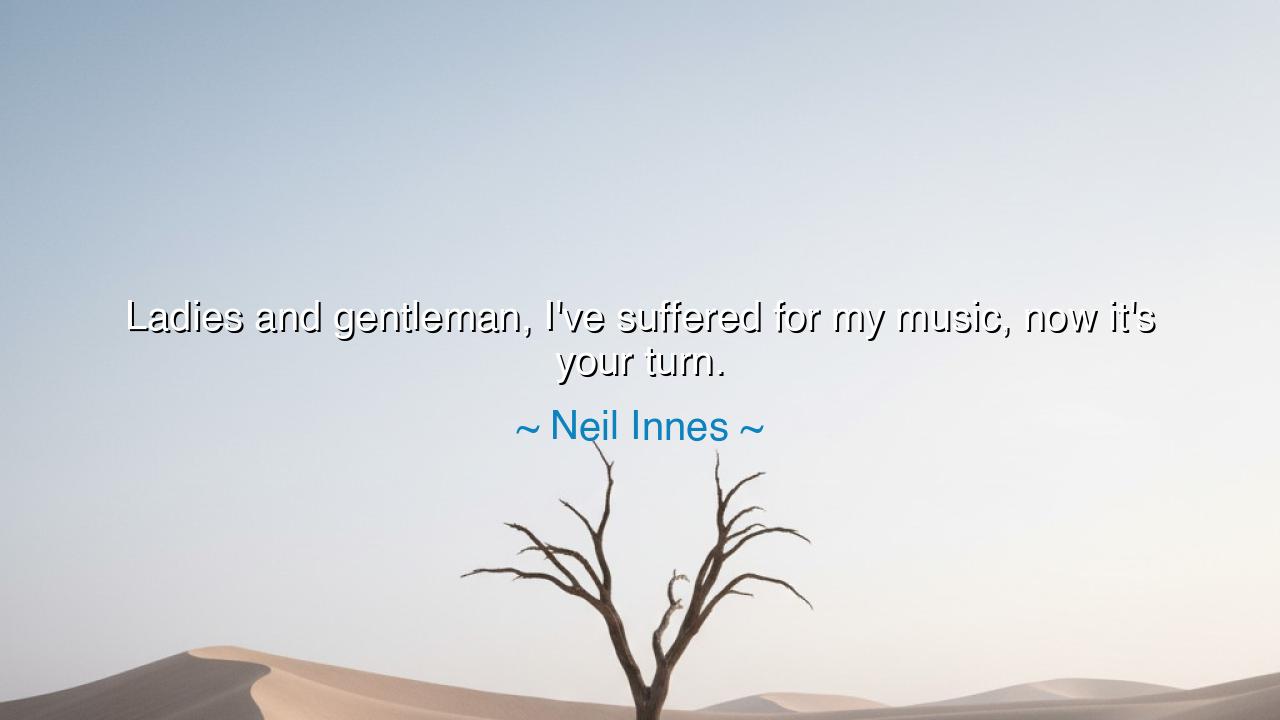
Ladies and gentleman, I've suffered for my music, now it's your






Neil Innes, with wit sharp as a blade and humor that cloaked truth in laughter, once proclaimed: “Ladies and gentlemen, I’ve suffered for my music, now it’s your turn.” At first glance, it appears a jest, a playful quip to provoke laughter. Yet beneath its mirth lies a deeper wisdom: that the creation of art often demands pain from the artist, and in its reception, it demands patience, reflection, and sometimes even discomfort from the audience. Music, true and unvarnished, is not always a sweet lullaby—it can be a mirror, a challenge, a burden that must be borne to understand its worth.
The ancients knew this paradox well. The poet Hesiod spoke of the Muses, who gave songs both of joy and sorrow, for one cannot exist without the other. Orpheus, greatest of all musicians, descended into the underworld, and his music was born of grief so deep it shook the heart of Hades himself. To bring forth song from silence is to wrestle with the unseen forces of the soul, and this wrestling brings wounds. Innes’ words, though dressed in jest, reflect this ancient truth: that suffering is stitched into the fabric of creation.
Yet there is another layer. Innes was a satirist, known for parody and playful mockery, and in this line he also exposes the tension between artist and audience. The musician labors, pouring sweat, tears, and time into his craft. But when the creation is shared, the burden shifts: now the listener must sit, must hear, must confront what the song carries. Sometimes the music delights, but sometimes it unsettles, pricks the conscience, or challenges the ear. Thus the artist says, with sly defiance: “I have carried the burden of creation; now you must carry the burden of reception.”
History gives us many examples. Consider Igor Stravinsky’s Rite of Spring. When it was first performed in 1913, its fierce rhythms and strange harmonies shocked audiences. Some called it noise, some even rioted in the theater. Stravinsky had suffered for his music, battling to birth a sound unlike any before. And when it reached the ears of the crowd, they too suffered, unable to reconcile their expectations with the raw power before them. Yet today, that very work is hailed as a masterpiece. What was once suffering became revelation.
In this way, Innes’ quip becomes more than humor—it becomes prophecy. Every great work of music bears this dual suffering. The artist is wounded in its making, torn open to reveal something true. The audience is wounded in its hearing, forced to confront beauty or dissonance that unsettles their easy comforts. But from these twin trials comes growth, for both artist and listener emerge changed. Suffering in art is not destruction, but transformation.
The lesson is clear: do not shy away from the art that unsettles you. Do not dismiss the music that confuses, challenges, or even irritates you. For often, it is in these moments that the deepest truths are revealed. And for those who create, know that your pain, your labor, your long nights are not wasted. The burden you bear in creation becomes the gift you hand to the world. And though it may sting at first, in time it may heal, inspire, or awaken.
Practical wisdom follows: when you encounter art—whether music, painting, poetry, or thought—listen deeply, even if it tests your patience. Ask yourself: What truth hides in this discomfort? What gift lies within this suffering? And if you are an artist, wear your suffering not as shame but as proof of devotion. For in the act of creating, you walk the path of Orpheus, of Stravinsky, of every soul who dared to bring forth sound from silence, light from darkness.
So remember Neil Innes’ words, wrapped in jest yet rooted in wisdom: “I’ve suffered for my music, now it’s your turn.” Let them remind you that art is a shared burden, borne by both creator and listener. Embrace it, endure it, and grow from it. For in this mutual suffering lies the power of transformation, and in transformation lies the eternal purpose of music.






AAdministratorAdministrator
Welcome, honored guests. Please leave a comment, we will respond soon